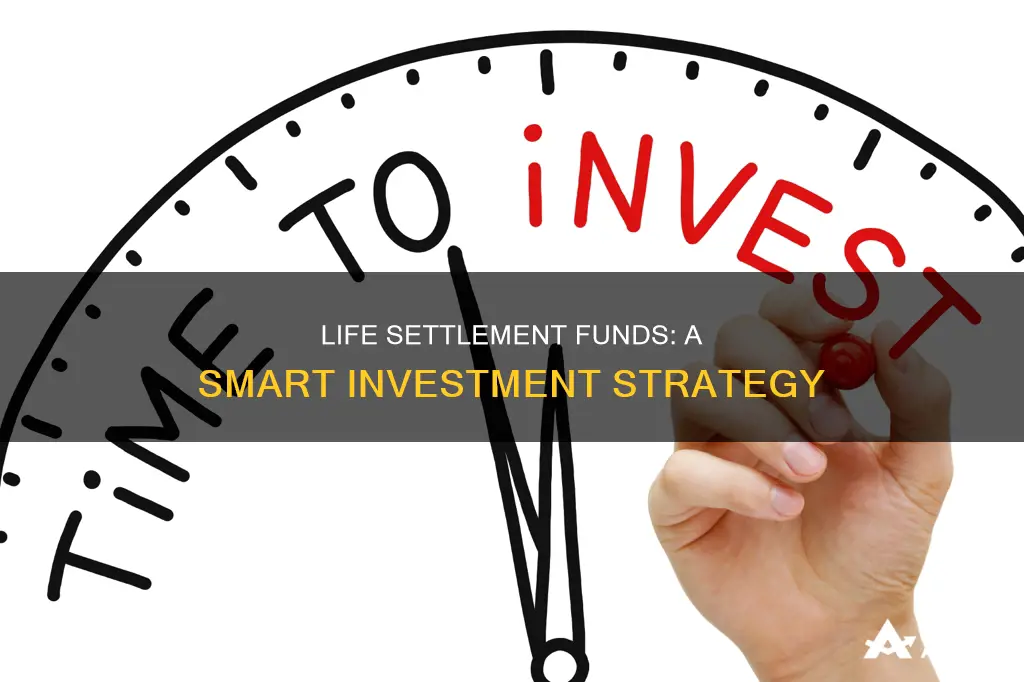
Life settlements, or the sale of life insurance policies to third-party investors for cash, have become an increasingly popular source of retirement income for ageing, cash-poor Americans. For investors, life settlements can be a low-risk, high-return opportunity. The life settlements market has grown in size, with estimates of the overall market ranging from $240 billion to $600 billion of policy benefits. In this article, we will explore the topic of investing in life settlement funds, including the history of life settlements, the benefits and risks for investors, and the key considerations for those looking to invest in this asset class.
| Characteristics | Values |
|---|---|
| Definition | The purchase of an existing life insurance policy at a discount to its face amount |
| History | Life settlements have been around since 1911 when the U.S. Supreme Court established that life insurance policies are assets that can be sold |
| Legality | Legal in most U.S. states; does not amount to stranger-owned life insurance (STOLI), which is illegal |
| Participants | Sellers are typically seniors who need money for retirement; buyers are institutional investors such as hedge funds, mutual funds, financial institutions, and insurance companies |
| Benefits | Low-risk, high-return investing with low market correlation; no ongoing fees; creates a win-win opportunity for both buyer and seller |
| Risks | Longevity risk due to uncertain life expectancy; Confusing regulatory requirements that vary by state; access restrictions in most states |
| Returns | Potential for double-digit returns, outperforming the stock market; fixed returns of 10% or more annually |
| Taxation | The lump-sum payment received from selling a policy is generally tax-free, but a portion of the proceeds may be taxable |
| Diversification | Provides portfolio diversification due to low correlation with traditional markets and asset classes |
| Market Size | The life settlements market is estimated to range from $240 to $600 billion in policy benefits |
What You'll Learn

Pros and cons of investing in life settlements
Life settlements are an alternative investment opportunity that has been gaining popularity. In a life settlement, a life insurance policy is sold on the open market for a value greater than the policy's surrender value but less than the full policy benefit value.
Pros
- Attractive rates of return: Life settlement funds have produced consistent gains, ranging from mid-single-digit annualized returns to low double digits.
- Safety and stability: Returns are not tied to the performance of the stock market, housing market, interest rates, politics, or any other external factor.
- A true "win-win" investment: Seniors benefit by selling their unwanted or unneeded policies for cash, often receiving as much as four times their cash surrender value. Investors benefit from the return characteristics of life settlement policies.
- Highly regulated: The U.S. Securities and Exchange Commission closely watches the life settlement market, and federal regulations protect both sellers and buyers.
- Improved data and accuracy: Life expectancy underwriters have become much more adept and accurate at estimating life expectancy, reducing the risk for investors.
- Higher returns: Life settlement investments have typically delivered returns in the 10% to 14% range, which is better than the returns from the equity markets and major market indices.
Cons
- Longevity: The longer the policyholder lives, the smaller the return for the investor. There is no way of knowing how long someone will live, especially with the pace of medical innovation and advancements. Once the seller breaks the expected lifespan barrier, the expected return rate starts diminishing.
- Underwriting: Despite improvements, there is still a risk of inaccurate life expectancy estimates, which can affect the investor's timeline and annual yield.
- Limited access: Not everyone can invest in life settlements. In most states, you must be a professional in the financial sector with the appropriate credentials. However, large, reputable investment companies allow individual investors to buy into their life settlement funds.
- Confusing regulatory requirements: Life settlements are regulated at the state level, and the disclosure, contracting, and other requirements for brokers, buyers, and sellers vary by state.
- Funds tied up: Money is typically tied up in a life settlement investment for several years, and it is not simple to withdraw funds early.
- Selection and management: Life settlements require expert selection, management, and oversight. Investors must carefully analyse each policy and address the risk of longevity by adjusting their offers accordingly.
Tax Managed Mutual Funds: When to Invest for Maximum Benefits
You may want to see also

Who are the major investors in life settlements?
When considering who the major investors in life settlements are, many are surprised to find that insurance companies are the biggest purchasers. They not only buy their own policies but also purchase policies from other insurance companies.
Other institutional investors include investment banks, hedge funds, and pension funds. Well-known individuals such as Bill Gates and Warren Buffett have also been known to invest in life settlements.
Both accredited investors and institutional investors can invest in life settlements and life settlement funds. Accredited investors are federally qualified by their size, net worth, and other characteristics to invest in non-registered securities. Institutional investors, such as mutual funds, hedge funds, financial institutions, and endowments, pool money to invest on behalf of others.
Currency Funds: Diversify Your Portfolio and Gain Globally
You may want to see also

How to reduce risk exposure with life settlements
Life settlements are a growing industry, but many investors are initially cautious because they are unsure if they are a safe investment. However, there are several steps you can take to reduce risk exposure.
Firstly, it's important to note that life settlements are backed by top-rated insurance companies, and legal reserve life insurance companies always pay out death claims. To reduce risk exposure, investors can:
- Utilise conservative life expectancies
- Purchase policies at a discount
- Control fees on the front end
- Work with a company with a proven track record, using experienced providers and servicing companies, and ensuring that all money is held in escrow by licensed and bonded custodians
Additionally, life settlements are highly regulated, which protects both the investor and the insured. There is also more data available than ever before, allowing investors to work with life expectancy underwriters to determine an accurate estimate. This is important because the longer the insured lives, the smaller the return.
Maximizing HSA Investment: Fidelity's Smart Strategies for Tax-Free Growth
You may want to see also

Factors to consider when deciding whether to sell
There are several key factors to consider when deciding whether to sell your life insurance policy through a life settlement. Firstly, evaluate your ongoing life insurance needs. If you're planning to buy a new policy with the proceeds from the life settlement, consider whether you'll be able to obtain equivalent coverage and at what cost. Your previous policy will still be in force through the new owner, which may impact your ability to get additional coverage. Additionally, your age or changes in your health status may result in higher premiums for a new policy. If your goal is to reduce premiums or obtain different features, explore alternatives such as reducing your existing coverage or making a "1035 Exchange".
Secondly, consider less costly alternatives. If your decision is driven by a need for cash, be aware that surrendering your life insurance policy or pursuing a life settlement are not your only options. You may be able to borrow against your policy or explore accelerated death benefits if you have a long-term, catastrophic, or terminal illness. Check with your insurance company to discuss these possibilities before entering into a life settlement.
Determining a fair price for your policy can be challenging. To ensure you're getting a competitive offer, shop around by contacting multiple life settlement companies, using a licensed life settlement broker, or consulting your investment professional or financial services provider. You can also use a self-directed online exchange for an estimate, but this may result in unsolicited sales contacts.
The lump-sum payment received from a life settlement can have tax implications, and it may negatively impact your eligibility for state or federal public assistance programs like Medicaid. Carefully consider your current income needs against the future financial needs of your survivors. Even if your beneficiaries don't currently require the proceeds from your insurance policy, ask yourself if this situation could change. Explore other sources of liquidity or alternative ways to access your insurance proceeds before proceeding with a life settlement.
Finally, keep in mind that selling your life insurance policy will grant the buyer access to your personal information, including your health status. This information may be shared with other entities, and you may be required to provide periodic updates about your health. Carefully weigh the benefits of the life settlement against the potential loss of privacy.
Vanguard Mutual Funds: Choosing Wellesley or Wellington
You may want to see also

How life settlements work
A life settlement is a financial transaction in which a life insurance policy is sold on the open market for a value greater than the policy's surrender value (the cash value of the policy which the insurance company will pay to buy back the policy) but less than the full policy benefit value.
In a life settlement, a senior policyholder sells their life insurance for more than its surrender value. The buyer, or investor, receives a return when the insured dies and the policy's death benefit is paid out. The selling policyholder generates extra income by cashing out the life insurance asset for a good price, and the investor secures a low-risk, high-return asset.
Life settlements are a growing industry, with an estimated market size of $240 to $600 billion in policy benefits. They are particularly beneficial for retirees who are at risk of not having enough income to maintain their lifestyle.
There are several reasons why someone might choose a life settlement, including:
- Retirement: Life settlements are often called senior settlements as they provide retirees with a largely tax-free payout to supplement their retirement income.
- Unaffordable premiums: Rather than letting a policy lapse due to unaffordable premiums, a life settlement can result in a higher cash payment from the investor.
- The policy is no longer needed: The insured party may no longer need the policy for their dependents.
- Emergencies: The policyholder may need to sell the policy to cover unexpected expenses, such as medical procedures or family emergencies.
When considering a life settlement, it is important to understand the existing policy, the details of the settlement offer, and how the broker is compensated. It is also crucial to shop around and compare offers from multiple life settlement companies to ensure a fair price.
Life settlements can provide a valuable opportunity for both policyholders and investors, but it is important to carefully evaluate the risks and benefits before proceeding.
Investing in Closed-End Muni Funds: A Comprehensive Guide
You may want to see also
Frequently asked questions
A life settlement is a financial transaction in which a life insurance policy is sold on the open market for a value greater than the policy surrender value but less than the full policy benefit value.
Some of the pros of investing in life settlements are that they are low-risk, they outperform the stock market, and there are no ongoing fees. Some of the cons are that they are highly regulated, they can be difficult to access, and there is uncertainty around longevity.
You can get started by connecting with brokers or providers to participate in life settlement acquisitions, or by purchasing shares of a life settlement fund, which owns and maintains hundreds of life insurance policies.







